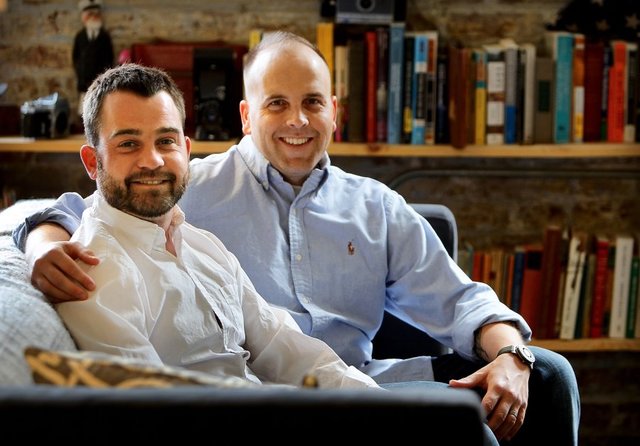>> Gay Marriage Plaintiff: We Want to Be ‘Just Another Ordinary Married Couple’
[spacer]
Dans leur loft de Memphis, Thom Kostura et Ijpe DeKoe forment un couple sans droits ni légitimité. Légalement mariés à New York mais pas au Tennessee où ils vivent, ils réclament devant la Cour suprême la légalisation du mariage gay à travers tous les Etats-Unis.
Ijpe, réserviste de l’armée américaine, a « vraiment hâte: il y a plein de gens qui veulent être à nos côtés, qui nous soutiennent. Mais aussi beaucoup d’autres qui sont contre nous. C’est un moment vraiment intéressant, on est au sommet de cette vague qui est sur le point de s’abattre ». Le couple sera à Washington mardi pour entendre plaider leurs arguments devant la plus haute Cour du pays.
S’ils ont bon espoir de l’emporter avec les quatorze autres plaignants homosexuels de quatre Etats, ils ont encore du mal à « réaliser que l’enjeu est national » et qu’ils ont peut-être rendez-vous avec l’Histoire.
D’une rencontre douze ans plus tôt chez les scouts, les partenaires se sont dit « oui » à New York en 2011, alors que le mariage homosexuel était légal depuis à peine onze jours. « Nous étions probablement le premier couple gay de notre comté à nous marier », se rappelle Ijpe, 36 ans, d’origine néerlandaise, naturalisé Américain trois ans plus tôt. « C’était irréel, nous nous sommes mariés en 24 heures avec une pizza et du prosecco (un vin italien, ndlr) sur la plage », raconte le soldat qui était sur le point d’être déployé en Afghanistan.
Neuf mois plus tard, quand le militaire est affecté sur la base de Millington, le couple déménage dans le Tennessee, un des treize Etats américains qui non seulement interdit le mariage homosexuel, mais aussi ne le reconnaît pas lorsqu’il a été légalement célébré ailleurs. « C’est vraiment douloureux de voir que la promesse que nous nous sommes faite de prendre soin l’un de l’autre n’est même pas reconnue ici », lâche Thom, l’artiste du couple, sorti de l’anonymat pour être au coeur de la lutte pour le mariage homosexuel.
« Dans le pire des scénarios, si quelque chose m’arrive, tu devras accepter mon certificat de décès qui stipulera que je suis mort en célibataire », dit à son conjoint l’étudiant sur le point d’être diplômé du Memphis College of Art.
« Quand on va à la préfecture, chez le docteur, et n’importe quel autre endroit où on nous demande notre état civil, il faut choisir. Le Tennessee nous oblige à déclarer que nous sommes célibataires, mais pour moi ça revient à trahir la personne avec laquelle je suis engagée », explique le peintre, 32 ans, dont les toiles géantes ornent le loft aménagé dans une ancienne usine qui fabriquait des couverts en argent.
Habitué des « roadtrips », le couple s’amuse à passer les frontières des Etats américains en proclamant: « mariés » ou « pas mariés ». « C’est intéressant de voir que lorsque nous traversons une frontière, une ligne imaginaire dans les bois tracée par un Etat, soudain tout notre amour et notre relation ne sont plus reconnus », ajoute Ijpe, dont le mariage est reconnu dans l’armée.
Persuadés que « l’Amérique est prête » à faire le grand pas, les deux hommes comptent bientôt trouver « une paix intérieure » et mettre fin à leur jeu des « roadtrips ». « J’ai hâte de voir le soulagement de tous ceux concernés par cette loi, quand ils ne seront plus obligés de subir ces affronts du quotidien », explique l’artiste, « enthousiaste » à l’idée de s’asseoir « pour la première fois de sa vie », dans l’impressionnante salle d’audience de la Cour suprême. « Nous sommes vraiment au centre de l’ouragan », reconnaît-il.
[spacer]
>> Thom Kostura and his husband Ijpe DeKoe are plaintiffs in the Tennessee Supreme Court same-sex marriage case. Kostura is a graduate student and DeKoe is a Sergeant in the Army Reserves.
« We’re seeking the recognition that our marriage deserves »
This is the first in a series from Thom Kostura and Ijpe DeKoe chronicling their experiences as the Supreme Court considers overturning state bans on same-sex marriage.
I knew Ijpe and I had made a unique connection when we met 16 years ago. We were working as camp counselors that summer, and we immediately knew that we had found something special in one another. After we left camp, we maintained a close friendship for a decade before acknowledging what we had known all along — we couldn’t be apart. In 2011, while Ijpe was on a three-day pass from his mobilization training in Fort Dix, New Jersey, we were married — dressed in khakis and white T-shirts — in a New York ceremony that wasn’t fancy, but was perfectly us.
We never could have predicted that our marriage and commitment to one another would lead us here: plaintiffs in the Tennessee marriage case that is one of the biggest U.S. Supreme Court cases in history, with millions of people looking to us as the Court prepares to hear arguments on April 28 that could result in a nationwide marriage-equality decision.
While we’ve had months to consider the impact that the hearing and our case will have on our nation’s history, the true reality still hasn’t sunk in for us, even with the hearing only days away.
After a recent talk at the University of Memphis, dozens of people waited in line just to shake our hands. Us. Ijpe and Thom. A couple of guys who decided they needed to stand up for their rights and commitment to one another and challenge Tennessee’s marriage ban. One student even told us that he knew everything about us because he wrote his thesis about our case.
When we decided to get married, we did it for the same reasons that others do. We couldn’t imagine our lives without one another, being there for one another, building a life together, and protecting one another — something that became especially important as Ijpe was set to begin a nine-month deployment in Afghanistan a week after our wedding.
During those months when he was serving the country, I spent every day hoping he was OK and watching the calendar for the date we’d be together again. I couldn’t have been happier when he returned. We were stationed in Memphis, where we began building our lives as a married couple and talking about starting a family.
But soon after moving to Memphis, where I’m a graduate art student and Ijpe is earning a bachelor’s degree while working full time as a sergeant for the U.S. Army Reserve, we realized the extent of Tennessee’s laws that ban marriage equality and prohibit recognition of marriages performed in other states.
In Tennessee, Ijpe and I are considered legal strangers. Roommates. Nothing more, nothing less, despite of and in contradiction to our legal marriage as recognized by the State of New York. This lack of recognition puts the life that we are building together at risk. We are unable to make medical decisions if one of us is injured, and if we were to have children through adoption, Tennessee would not recognize us both as parents. If our parentage is not recognized by the state, medical facilities, daycares, schools, or any other institutions in this state have no legal obligation to recognize it, either. These are just a few of examples of the limbo Ijpe and I are placed in every single day — for no reason other than we happen to be two men who are married to each other.
In 2013, we decided to stand up for our relationship and join two other couples in a legal challenge to the state’s ban. As the case worked its way through the court system, the possibility of a Supreme Court hearing wasn’t on our minds. But as next Tuesday draws near, the magnitude of the event is almost too overwhelming for us to grasp.
When we got involved with this case, we had many serious and lengthy discussion as to the possible impact on our marriage. Would it make us stronger, or force us apart? Would we be up to the challenge of opening up our lives to strangers? Would we be willing to answer hard questions about the validity of our relationship? Ultimately, we decided that the risk was worth the task and that we were willing to do our part. This was our brick in the road. As a result, we have received a wave of support and friendship that we had not expected.
We’ve been frequently asked how our lives have changed since becoming plaintiffs. To be honest, in many ways it hasn’t. Ijpe reports to the base daily for duty and goes to classes at the University of Memphis at night. I’ve spent countless hours preparing for my thesis defense and an upcoming graduating show. Between those obligations we juggle the groceries, car repairs, paying the bills – all of the challenges of living a life together. It’s only now, with the oral argument near and my thesis defense safely behind, that the true importance and bigness of everything is starting to sink in. Recently, Freedom to Marry, an organization that campaigns for nationwide same-sex marriage, presented us with a binder of more than 3,000 personal expressions of thanks and support from people across the country. Wow.
What has also changed is our fundamental understanding of the legal process that the case has gone through and how important our justice system really is. The case has made us very aware of the vast amount of attention that marriage equality has garnered in recent years and the intense legal focus of this debate. Viewing this through the lens of a participant has been much like a workman discovering the inner working of a complex machine. It’s both intimidating and fascinating to learn how valuable our rights are, and, how through the work of so many, they remain protected.
We didn’t start this thinking we would make history. All we wanted was to be recognized as a married couple. We’re not asking anyone to change their minds about marriage. We are both firm believers that everyone is entitled to their own opinions. We don’t believe in subjugating other fellow Americans because they don’t share our same values. Diversity and freedom of expression are what make America a great country.
What we want most in the world is to be recognized for who we are — just another ordinary married couple seeking the recognition that our marriage deserves.


















